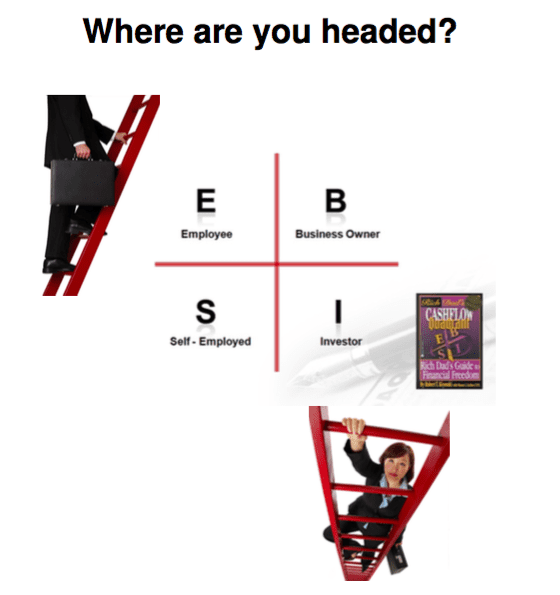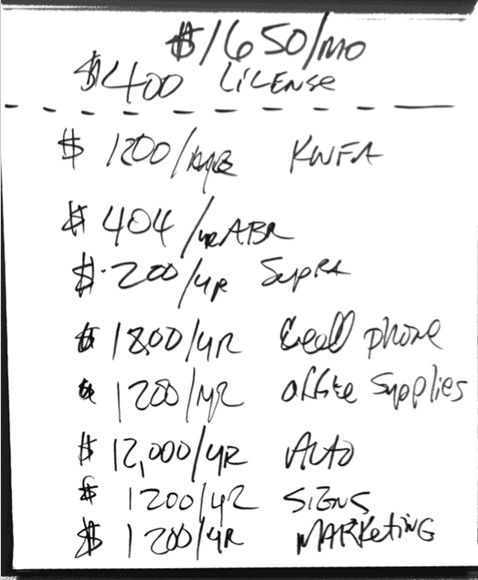Running your real estate practice like a Business can allow you to make the most of the money you make!
There are 11 questions that you can ask yourself to determine whether or not you have a “real” business. Most real estate brokers focus only on real estate sales skills because they are building their brand and training horses to pull their wagon. Keller Williams Realty also focuses on building business owners. This means that there is an additional conversation going on at KW and that is where lives get changed. Agents who are a part of the Keller Williams Realty training culture may very well graduate from being an agent someday to diversifying, managing a team, becoming an Operating Principle or owning an office by expanding into another city, state or country.
1. Are you incorporated?
The Key Concept here is an understanding that as a Sole Proprietor, you are personally responsible for everything. You are also liable for everything. That may not come as any surprise in the beginning of your journey as an entrepreneur. But as Michael Gerber pointed out in his best-selling book ( The E-Myth Revisited), taking your passion into the business world can have some unintended consequences if you are successful. Getting incorporated as a real estate practitioner is the first step to creating two worlds: “You” and “Not You”. “You” are the person you now employ to run your company. “Not You” is the company.
2. Are you capitalized?
In other words, did you forecast what it would cost to operate your practice for 6-12 months (including paying your salary) AND save that amount up? That is the initial definition of capitalization. In real estate, you have to get licensed first. You will then need equipment to start working (signs, lockboxes, phone, car, insurance, computer, printer, pens, paper, etc.). After that you will have monthly expenses (MLS dues, internet service, gas, oil, errors and omissions insurance, broker support, etc). Once your business is off and running you will still need capitalization in the form of a reserve account to carry you during down times.
3. Do you have separate personal and business checking accounts?
This should be self-explanatory but there is more to it than you might think. You need 7 accounts to keep everything in its place because mixing money blurs the lines.
4. Do you have a budget?
The budgeting process can be tedious the first time you do it. Every dollar has a name and a home. That is why it makes so much sense to hang around people who live by budgets.
5. Do you produce and review a monthly P&L statement and balance sheet?
Bookkeeping is usually not an entrepreneur’s strong suit. Thankfully, there are a number of small businesses that can do bookkeeping for small businesses.
6. Do you have a written Business Plan that you are following and reviewing monthly?
October is business planning month in most industries. That is when the vision and goals for the following year are outlined on paper. Real estate – when operated like a business – is no different. Setting goals is one thing. Achieving goals requires that you think through the daily, weekly and monthly activities needed to produce those goals.
7. Do you have systems in place?
For real estate agents, there is a best-selling book called The Millionaire Real Estate Agent by Gary Keller which researched the businesses of top agents from across the U.S. This book consolidated all that research into systems and models by which real estate agents can build HUGE businesses.
8. If you were gone for 3 months, could it run itself ?
Most real estate agents have other agents who can cover their clients while they are on vacation. However, these relationships are not designed for OR capable of handling ongoing client needs for an extended period of time. Plus, surviving is not really the goal here. A true business has plans for growth too. You know you have a business when the people and systems you have in place can sustain the business and possibly even achieve growth while you are gone for 3 months or more.
9. Do you have staff (Employees or Associates)?
This may be one of the first steps after incorporation and separate checking accounts. Once success begins to show up, entrepreneurs can quickly hit a wall in the delivery of their service or product because there are just not enough hours in the day. Knowing what and when to leverage out some of the job is crucial to being able to handle the hard-fought rewards of success.
10. Do you have a Board of Directors?
A diverse board of directors is essential for accountability and peak performance.
11. Can the business fire you for non-performance?
This is the last and final sign that you want this business to prosper. Many times the young entrepreneur who launched the company ends up being the very reason it does not grow beyond a certain point.
So, where do you start?
You can start right here. The Sandy Springs market center of Keller Williams Realty has an agent led Board of Directors called the Agent Leadership Council (or ALC). This is true for all Keller Williams Realty offices. Each year the ALC’s form committees and one of these committees focuses on Finance. As the Chairman of the Finance Committee for the Sandy Springs ALC, I will be leading conversations throughout the year on how to Run Your Business Like a Business. Our committee is committed to reaching out to every agent in our office so that they are aware of the advantages of answering the above questions for themselves.
Questions?
Contact me at michael@BunchRealEstateGroup.com





